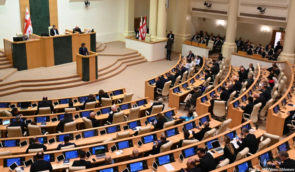How to improve access to justice for people
The academic dictionary explains the word “definiteness” as clearly defined, exact.
The Ukrainian legislation has a lot of contradictions, thereby affecting the legal definiteness of persons both legal and natural. So the disputes break out and the complaints are filed with the courts, resulting in an increase in the number of cases.
As far as I know, the greatest burden is laid on the municipal courts of regional centers, high courts and the Supreme Court of Ukraine. The courts have such huge number of cases that judges cannot physically comply with the terms of consideration of cases defined by the law, not because they do not want to comply with them. In addition, such a load on judges cannot but affect the quality of the delivered judgments.
This problem can be solved in several ways – by increasing the number of judges in the courts (but now even the vacant positions of judges are not filled in the manner prescribed by law), or by increasing the cost of going to court so that the people themselves will no longer go to court or will use the available legislation database of the Verkhovna Rada of Ukraine.
However, the legislators have followed the path of increasing the cost of court fees.
Thus, the amendments to the law of Ukraine on court fees, which significantly increased the court fee rates, came into force on September 1, 2015. This was done despite the fact that the court fees automatically increase each year due to increase in the minimum salary.
If before September 1, 2015, the size of court fee for the appeal against the court ruling totaled UAH 121 for all persons, after that date the fee reached UAH 243 for individuals and UAH 1,218 for legal entities.
Moreover, if a legal entity wins the case, the legal costs will be collected from an individual. Currently, the courts consider a large number of cases over recovery of debt for utilities, where the size of debt does not reach even hryvnia 1,000, as well as cases over unpaid loan interest that have arisen, including, due to the financial crisis.

I, as a judge, have not heard any positive comment on such changes while communicating with my colleagues. Because of the non-payment of court fee, it is the judiciary who will return the claimants their appeals or cassations, and, therefore, it is we who will be guilty in the eyes of such persons. Although judges, like all the citizens, must comply with the rules of law, and thus the credibility of the judiciary would be further undermined.
No one will deny the fact that the mankind has not invented another democratic way to solve the dispute besides the court system.
We need to return people to courts for settlement of their disputes amid the large-scale impoverishment of the people, amid the explosions and shelling in a peaceful territory, amid radicalization of the society. It is the significant and the only way for a democratic solution to the dispute, even taking into account all the current problems in our courts.
A further increase in fees for consideration of a case in the court may provoke people into defending their right in an unlawful way. This may happen not because people want so, but because they have no other choice.
I cited the term of definiteness at the beginning of this column.
So, one of the reasons for a large number of cases in the courts is that people lack legal definiteness.
The legislators cannot take into account all the real-life situations that arise when adopting a law.
The judicial power has been criticized for the fact that it makes different decisions on one and the same issue and deprives people, lawyers, judges of legal definiteness, i.e. a uniform application of one and the same provision of the law. Therefore, in this situation, it is reasonably to enter Chapter 3 “Revision of Judgments by the Supreme Court of Ukraine” into the Code of Civil Procedure. Part 1 of Article 355 of this Chapter indicates the grounds for such a revision, including not uniform application of one and the same provision of the substantive and procedural law.
The academic dictionary defines a precedent in law as a court decision that is cited as an example or analogy to resolve similar questions of law in later cases.
The legislators have gone further and stipulates in Part 1 of Article 360-7 of the Code of Civil Procedure that the conclusion of the Supreme Court of Ukraine on the application of the law is not just a pattern, but it is also mandatory for all the subjects of power, which use the law or regulation containing the appropriate legal standard in their activity.
The practice of application of this legal standard has faced difficulties, as there is a large number of such findings in various fields of law. Hence, it is very difficult to find them among a large number of judgments. And because the legislator used such terms as “all” and “mandatory” in Article 360-7 of the Code of Civil Procedure, there is a need to go further.
The development of computer technology allows linking the findings of the Supreme Court to the relevant articles of the laws and regulations published on the website of the Verkhovna Rada of Ukraine.
Thus, lawyers, judges, and even ordinary people will have access not only to the legislation of Ukraine, but will also be able to see how the relevant law or regulation is applied by the highest judicial body in the system of courts of general jurisdiction. This will result in the legal definiteness, i.e. the vision of how your dispute will be settled and whether you need to go to court at all.
I am convinced that such a change would lead to the uniform practice and reduction in the number of cases in the courts.
Serhiy Bondarenko, the judge of the Court of Appeal of Cherkasy region











